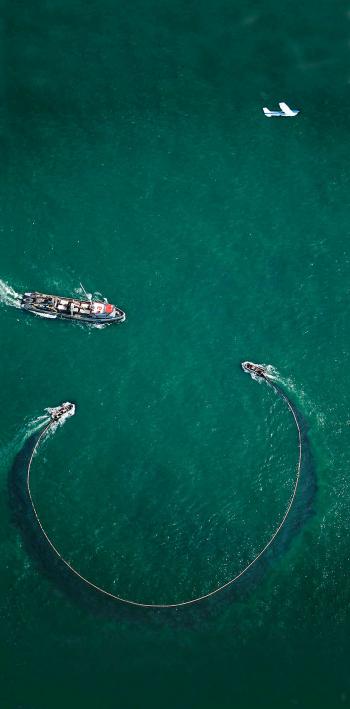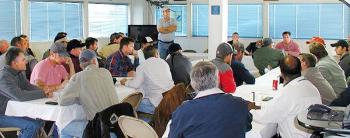
A spotter plane, upper right, directs fishing boats to a school of menhaden, also known as pogy.
(Submitted Photo Courtesy of Omega Protein)

Prior to the start of each menhaden season — which runs from the third Monday in April through Nov. 1 — Perry Flying Center in Patterson hosts representatives of the menhaden processing companies, the FAA, U.S. Customs, Homeland Security and the various helicopter operators, which operate in the Gulf of Mexico, to discuss safety, communications and airspace procedures.
(Submitted Photo Courtesy of Omega Protein)
Omega Protein spotter pilots briefed at Patterson airport
With the start of the menhaden season April 21, fish spotters converged on the Patterson airport to begin their search for pools of the small, oily-fleshed, silver fish that are processed into omega-3 oils for human consumption.
Spotters fly Cessna 172 and Cessna 182 single-engine planes over the Gulf of Mexico directing fishing boats toward the schools, according to Duane Davis, chief spotter in the Eastern Gulf of Mexico for Omega Protein.
The fishing boats or “steamers” each deploy a pair of 40-foot-long seine boats that stretch a purse seine around the identified school of fish. The 165-foot steamer moves to the opposite side to help direct the fish into the net, Davis explained.
The spotters directing traffic from the sky are typically trained for three years, but “it takes five to 10 years to make a good spotter,” Davis said.
Flying anywhere from 500 to 5,000 feet above the Gulf, schools of the small fish are difficult to see.
“Once we find them, then the work starts. It’s pretty hard to find them. … You go through, sometimes, hours of boredom and then shear panic,” Davis said.
In a typical day, a spotter will set 10 to 20 sets in about four hours, Davis said.
The spotters work for Omega Protein whose closest plant is in Abbeville. Consolidation of Gulf operations in the off-season left Abbeville as the sole Louisiana plant, down from four (including one in Amelia) about 15 years ago, said Ben Landry, Omega Protein director of public affairs.
Al Vidrine, Abbeville plant general manager, said his plant operates 13 boats and 11 spotters.
“For the early part of season, (fishing is) going very well,” Vidrine said.
Landry added that as the weather gets warmer, the fish catch improves.
“Our heavy months would be July and August. … Al is correct in saying fish catch has been pretty strong considering this early in the season it can be very sporadic at this time,” Landry said.
The Abbeville plant can process 275,000 fish an hour, or about 6.5 million fish per day, Vidrine said.
“We station our spotters in different areas. They fly out of Port Arthur, Lake Charles, Lafayette, Abbeville, Houma, Patterson. We have that because of weather. In one area it might not be foggy or if another area is bad with thunderstorms, they can go into other airports and we can keep our boats covered better like that,” Vidrine said.
Prior to the start of each menhaden season — which runs from the third Monday in April through Nov. 1 at midnight — Perry Flying Center in Patterson hosts representatives of the menhaden processing companies, the FAA, U.S. Customs, Homeland Security and the various helicopter operators, which operate in the Gulf of Mexico, who meet to discuss safety, communication and airspace procedures for the upcoming season.
“I am proud of our nearly 30-year history of hosting this event,” said Ken Perry, owner of Perry Flying Center. “It is important that everyone be on the same page when it comes to operating over the Gulf. Many folks do not realize that the Gulf Coast of Louisiana and Mississippi is some of the most congested airspace in the world.”
Perry said the skies are especially crowded during the summer months and even more so on mid-week offshore crew change days.
“All of us in the offshore energy, fishing and aviation industries must work together to provide the safest environment for the pilots and passengers who utilize the airspace over the Gulf of Mexico,” Perry said.
- Log in to post comments
